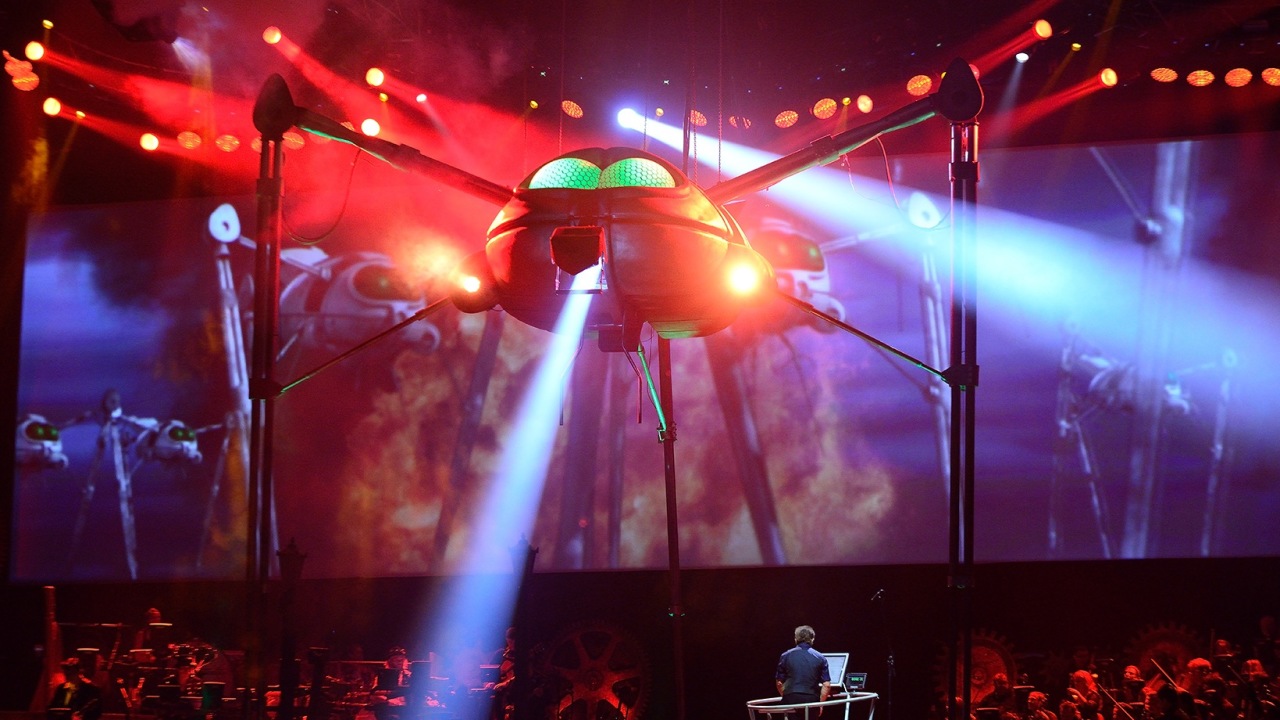When H.G. Wells’s War Of The Worlds was first broadcast on US Radio in 1938, it famously caused widespread panic. Three quarters of a century later, things are altogether more sedate as Jeff Wayne brings the New Generation version of his 1978 concept album to the stage. But what did we make of it all?
It’s an eclectic crowd While Jeff Wayne’s War Of The Worlds has always been regarded as something of a late 70s rock classic, it attracts a mixed audience tonight. There are those here because there’s an X Factor contender – Shayne Ward – plus a former boy bandolier, Brian McFadden. However, if the presence of Jason Donovan also adds to ticket sales, there are also those in Motörhead and Thin Lizzy T-shirts, the latter perhaps acknowledging Phil Lynott’s role on the original 1978 album.
It’s really a film with theatrical interludes Much of the action is on a vast screen at the back of the stage, with the occasional moment of activity on the stage. But the way it’s all choreographed is impressive. It never feels remote, and you are drawn into the storyline.
The orchestra is very rocking Chris Spedding is on guitar and one-time T. Rex/Sky man Herbie Flowers on bass gives the music an edge. But the whole presentation is certainly not anaemic. There’s a significant rock vibe throughout, with little pandering to the mainstream types who make up most of the crowd.
There’s a new song in the mix Jeff Wayne has added Life Begins Again towards the end of the performance. Obviously the hope is that it becomes a singalong, clapalong anthem. In all honesty, this doesn’t come across as a classic. But you can see it becoming climactically popular, as it involves the entire cast.
Liam Neeson – the holographic journalist? Liam Neeson isn’t actually here. His participation is restricted to being on screen and as a holographic image on stage. That makes him seem slightly sinister, if anything. And takes away from the vulnerability of the character. He’s more of an observer than a participant. But it adds to the alienating nature of the tale.
The moralistic nature of the story is accentuated H.G. Wells’ 1897 novel was never just pulp fiction. Having Wells onstage at various stages of his life – from 1898 to 1945 – puts the Martian atrocities into a more realistic context. It depicts the Martians as representing first the imperialistic nature of the British empire, then the slaughter of the First World War and finally the horrors of Hitler and other dictators. It makes the plot a lot more connected to current destitution. And it ends with a craft landing on Mars on New Year’s Eve 2014, reawakening the Martian threat.
It’s all about Nature As everyone knows, the Wells novel sees the invincible Martians beaten by bacteria. Nature finds its own way of repelling the threat. And this is loaded with the implication that whatever humanity attempts to do to the planet, Nature will always succeed in neutralising. It’s an ominous warning.
And it’s all about Jeff Wayne While he has never hidden his respect for the Wells novel, nonetheless to many The War Of The Worlds is now inextricably linked to Jeff Wayne. Here, Wayne is centre stage conducting events, and the huge reaction he receives at the end is confirmation enough that it’s his vision and talent we are witnessing.
It’s a triumph Yes, it would have been great to have more rock oriented singers, in keeping with the 78 ethos. But this production still holds everyone in its thrall. Iy’s billed as The Final Arena Tour, but that leaves everything open for other types of audio visual presentations. This is the War to end all Wars.

